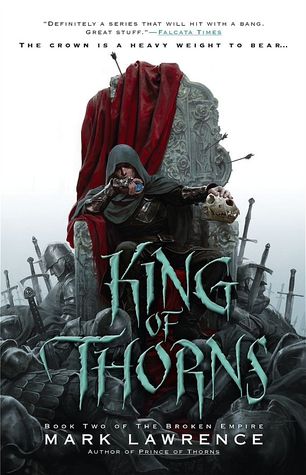 After reading a bit of the initial commentary on this book, some people mentioned that maybe there was a little too much focus on the magic system. Being a huge Sanderson fan, my thoughts were along the line of: there's no way, his magic is THE reason I love his novels, there's literally NO way.
After reading a bit of the initial commentary on this book, some people mentioned that maybe there was a little too much focus on the magic system. Being a huge Sanderson fan, my thoughts were along the line of: there's no way, his magic is THE reason I love his novels, there's literally NO way.As it turns out, there does seem to be a way, although only just a bit.
The magic of The Rithmatist [US] [UK] is as creative as ever. I've mentioned this before and I'll say it again, Sanderson's magic really takes on a life of its own in any of his books. I love the characters in any given book, but it's the magic that makes me want to live in the world forever. I want to see the magic used in every possible way and situation. And yet he tends to hold it back a bit. The "lashings" in The Way of Kings is only mentioned on a couple pages and I wanted to see the armor more and more. The whispers and colors in It's always so interesting and creative, I never thought I could ever tire of a Sanderson magic system.
Until The Rithmatist. Although I don't proclaim to have read all his works (still have Mistborn to read). It's not that it isn't as good as any other magic system Sanderson has created, it's more that it's actually overused for once. As I said above, I normally can't get enough, but here the main protagonist, Joel, is obsessed with Rithmatists. So it's all he can talk about. And it's third person limited on Joel, so it's all we hear about. And he lives at a school, half of which is devoted to Rithmatists. So it's all we hear about.
So besides the fact that I started to cringe every time the word "Rithmatist" was used, the plot is pretty standard and it has the standard YA characters. The mean professor (Snape), the students breaking the rules to save the day (Harry/Hermione/Ron), the uppity magicals versus the non-magicals (muggles), etc.
That is, until all these great mysteries are revealed and hinted at at the very end of the book. I have a feeling the next book will really get things going, but this installment was really just a prelude to set up the magic and the lay of the land with the United Isles archipelago.
Just to reiterate, the magic is excellent. The Rithmatists defend against wild chalklings who are two-dimentional creatures that attack and kill and must be contained at The Tower in Nebrask. Rithmatists use shapes drawn in chalk to both defend and attack by using geometric points of circles that must be drawn with exactitude or they will become weak. It's so well-thought out, it boggles the mind to see all that has gone into this and no wonder it gets mentioned over and over, it takes that long just to understand the different defenses that are used.
Sanderson has a reputation for great magic for a reason and demonstrates yet again why he has earned it. He's also created a vivid world full of technology powered by gears ("gearpunk" as Sanderson mentions in the afterword) and mysteries that abound. The magic is a bit over-explained and the plot is a bit stock in this first installment, but I'm really looking forward for what's to come because what's been hinted at here demands more reading.
3.5 out of 5 Stars (recommended)




